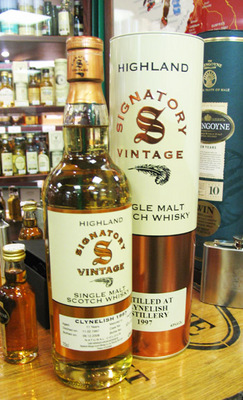|
|
Release Notes
A Signatory Vintage bottling of an 11 year old Clynelish from 1997. Only 407 bottles were filled from this cask.
Yours Truly
The Bottler: Signatory Vintage
| Established: 1988 |
| Silent since: False |
| Address: Edradour Distillery, Pitlochry, Perthshire & Kinross, PH16 5JP, Scotland |
Signatory owns the smallest distillery from Scotland, Edradour since 22 july 2002
In April 1992, as the company began to grow, they moved to much larger premises. Here, they were granted a licence to bottle their own products on site. They set-up a small line bottling system, primarily geared towards the bottling of single casks. Although the actual bottling of whisky is semi-automated, the emphasis is very much a hands-on operation, with hand labeling and packing of products. To add to the exclusivity of their bottlings, they often declare the cask number, date of distillation,and date of bottling on our labels. In addition,each bottle is individually hand numbered.
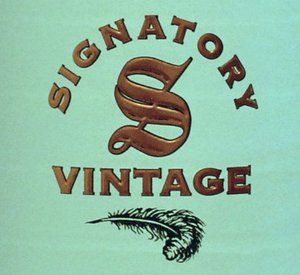
It is their aim, as an independent bottler to offer a range of whiskies, some of which are not bottled by the proprietor of a particular distillery, and some at different ages/strengths to those offered as distillery bottlings. The majority of their bottlings are the product of single casks, with the malt whisky enthusiast being given the opportunity to sample the subtle differences which occur with each different cask.
The name of Signatory derived from the fact that their initial intention was to find someone famous to sign the labels for bottles produced from one single cask. The first cask we purchased was a cask of 1968 Glenlivet, which was sold long before we could find a famous person.
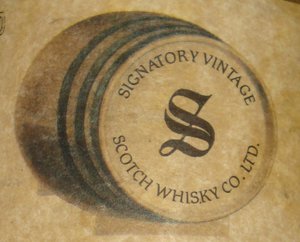
Until April 1992, when they moved to their current premises in Newhaven (Edinburgh), they operated from a bonded warehouse in Leith. Leith was once a well known port for importing wine from France. As this industry declined, many of the whisky companies began to occupy the old warehouses for cask storage purposes. In recent years, this has also declined, with the larger companies moving to the west of Edinburgh, where transport links are better.
The company was founded in 1988. It is a family owned and managed company, being one of only three true independent bottlers. They always like to draw a distinction between the independent companies who bottle their own products, and the independent companies whose products are bottled under contract. The other fully independent bottlers are: Gordon & MacPhail and Wm. Cadenhead.
from Whisky-Distilleries.info
The Distillery: Clynelish
| Established: 1967 |
| Silent since: False |
| Address: Brora, Sutherland KW9 6LR, United Kingdom |
| → website |
2005 - Clynelish is included in the expanded range of "classic malts" by whisky industry giant Diageo.
This profile is dedicated to the new Clynelish distillery, constructed in 1968 by SMD. The old Clynelish distillery right across the street is now known as Brora and was built in 1819 by the Marquess of Stafford. When the new distillery (circa three times larger than the first) went into operation the old Clynelish distillery remained operational and was re-named after the town.
Which reminds me; the occasional single malt Scotch whisky drinker might not be familiar with Diageo - so please allow me to quickly explain. Clynelish was initially licensed to a company named Ainslie & Heilbron (Distillers) Ltd., Glasgow. The Clynelish distillery became property of United Distillers in 1986. United Distillers merged with IDV (International Distillers & Vintners) in 1998 to form UDV, which is short for United Distiller & Vintners. If I understand the "Gordon Gekko" corporate structure correctly, UDV is either part of whisky industry giant Diageo or sort of synonymous with it. Diageo owns almost 30 different malt whisky distilleries.
When the new Clynelish distillery was built in 1967 and 1968 the stills were copied as closely as possible from those at the old distillery. I"ve been told that they achieved a close likeness to the old Clynelish house style - lightly peated but a much lighter style of whisky than the "Islay style" malts that were produced at Brora between 1969 and 1983. While most bottlings of Brora do very well on the Malt Maniacs Matrix the opinions about the average bottling of Clynelish tend to be more divided. Members of "the wine brigade" (like Serge and Olivier) who appreciate subtlety usually enjoy a Clynelish more than some of the "Nordic" maniacs who prefer heavier, stronger flavours. But that"s the beauty of the malt whisky world - the wide variety in styles keeps it interesting...
Meanwhile, the brand new Clynelish distillery fared better. The old malt had been popular among blenders and the spirit from the new distillery served their needs just as well. The new distillery used exact copies of the stills at Brora (simply more of them), so I guess that worked out pretty much as they had planned.

Partly due to the initial focus on blenders, Clynelish wasn"t easy to find as a single malt in the 1990"s. At some point a 14 years old semi-official "Flora & Fauna" bottling became available. This was replaced with the proper official bottling depicted above in 2003 - also bottled as a 14yo. Clynelish was included in Diageo"s "Classic Malts Selection" in 2005, along with (among others) Caol Ila, Cardhu, Glen Elgin, Glen Ord, Knockando and Royal Lochnagar. As the sole representative of the "Coastal East" region on Diageo"s new distillery map (you can find it on their website), it mirrors the lonely position of Oban in the "Coastal West" area.
Well, actually - it"s slightly more complicated than that. The old Clynelish distillery was closed in May 1968 and the new one went into production a month later. That could have been the last that we ever heard of the old distillery - if it hadn"t been for the weather in another part of Scotland, on the Western island of Islay. Due to a severe drought on the island, brand owners DCL (the owners of SMD) find themselves short on peated malts.
It"s not that the "Islay style" heavily peated single malts were as trendy as they are today; DCL just needed peated malt whisky for their number one blend; Johnnie Walker. The blend had a fair amount of Islay malts in its recipe and sales were growing fast. So, DCL decided to experiment with the production of a more heavily peated malt whisky on the mainland. The old Clynelish distillery happened to be vacant, so it was re-named Brora - and the production of malt whisky resumed again at the location in 1969. Brora enjoyed the new lease on life for more than a decade, but in 1983 the distillery was closed again - this time for good.
In the new Millenium
2002 - After being used mostly as a "volume" malt whisky for blending, a 14yo official bottling is released.
Trivia:
- Out of dozens of active distilleries owned by Diageo (27 in 2006), only three have a higher production capacity than Clynelish"s 3,400,000 litres; Caol Ila, Glendullan and Dufftown.
- In 1529 the first (and only) coal mine in the Highlands was opened in Brora.
- Brora isn"t just the name of the harbour town, it"s also the name of a nearby river.
- Rumour has it that this river Brora is one of the very best spots for salmon fishing in Scotland.
- Compared to the Brora malts Clynelish seems light in style, but in fact medium peated malt is used.
- Some people pronounce the name of the distillery as klein-LISH or klein-E-lish instead of KLEIN-lish.
from Malt Maniacs
The Owner: Diageo
| Established: 1997 |
| Silent since: False |
| Address: 8 Henrietta Place, London, W1G ONB, UK |
| → website |
Diageo also distributes Unicum, its lighter-bodied variant Zwack and Jose Cuervo tequila products in North America. However, Cuervo operates as a separate company in Mexico and is not owned by Diageo. Similarly Grand Marnier is distributed by Diageo in many markets, including exclusively in Canada, and a deal was reached in 2009 to significantly expand this partnership in Europe.
Furthermore, Diageo owns the Gleneagles Hotel.
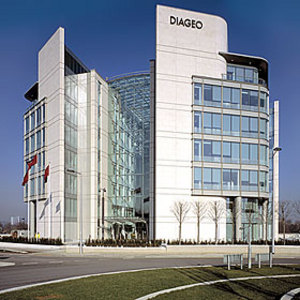
Diageo was formed in 1997 from the merger of Guinness plc and Grand Metropolitan plc. The creation was driven by the two executives Anthony Greener and Philip Yea at Guinness plus George Bull and John McGrath of Grand Metropolitan. The product portfolios of Guinness and Grand Met were largely complementary with little overlap.
Diageo is the world"s biggest whisky producer with 28 malt distilleries and two grain distilleries.The company operates the Scotch whisky distilleries of Auchroisk, Benrinnes, Blair Athol (situated at Pitlochry), Caol Ila, Cardhu, Knockando, Glen Elgin, Clynelish, Cragganmore, Dalwhinnie, Glenkinchie, Glen Ord, Lagavulin, Oban, Royal Lochnagar, Strathmill, Talisker, Teaninich, Mannochmore, Mortlach and Glenlossie, which are sold not only under their own name but used to make the various blended scotch whiskies sold by the company, and owns the stock of many closed distilleries such as Port Ellen, Rosebank, Brora, Convalmore, Glen Albyn, North Brechin, Banff, and Linlithgow. The company have opened a new malt distillery adjacent to their maltings at Roseisle (1st new make spirit produced Spring 2009). This will be one of the largest malt distilleries in Scotland. The new building contains 14 traditional copper pot stills. An expansion programme is also underway at its Cameron Bridge Grain Distillery in Fife that will make it the largest grain distillery in Scotland. Diageo also owns the Port Dundas Grain Distillery in Glasgow, and jointly operates the North British Grain Distillery in Gorgie, Edinburgh, with The Edrington Group.
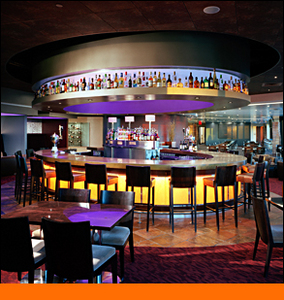
Diageo plc (LSE: DGE, NYSE: DEO) is the largest multinational beer, wine and spirits company in the world. The company is listed on the London Stock Exchange and has American Depositary Receipts listed on the New York Stock Exchange. The word Diageo was formed from the Latin dia (day) and the Greek geo (World), symbolising the use of the company"s brands every day, everywhere. Its head office is located in the City of Westminster in London. It is a constituent of the FTSE 100 Index.
Trivia:
- In December 2003, Diageo provoked controversy over its decision to change its Cardhu brand Scotch whisky from a single malt to a vatted malt (also known as a pure malt) whilst retaining the original name and bottle style. Diageo took this action because it did not have sufficient reserves to meet demand in the Spanish market, where Cardhu had been successful. After a meeting of producers, Diageo agreed to make changes.
- In 2006, the Cardhu brand quietly changed back to being a single malt.
- In July 2009, Diageo announced that, after nearly 200 years of association with the town of Kilmarnock, they would be closing the Johnnie Walker blending and bottling plant as part of restructuring to the business. This would make 700 workers unemployed and caused outrage from press, local people and politicians. A campaign against this decision was launched by the local SNP MSP Willie Coffey and Labour MP Des Browne. A petition was drawn up against the Diageo plans, which also involves the closure of the historic Port Dundas Grain Distillery in Glasgow.
- In February 2009 it was reported in the Guardian that the company had restructured itself so as to avoid paying tax in the U.K., despite much of its profits being generated in the U.K.
- Diageo is engaged in a tax scheme in the United States of America, commonly referred to as the "Rum Bailout", which will guarantee it USD$3 billion in revenues and profits.
- The National Puerto Rican Coalitionplans to run a series of ads in New York City and Puerto Rico urging a boycott of Diageo-owned alcoholic drinks to protest the giant British-owned corporation"s controversial production move of its Captain Morgan rum from Puerto Rico to the U.S. Virgin Islands.
from Wikipedia
